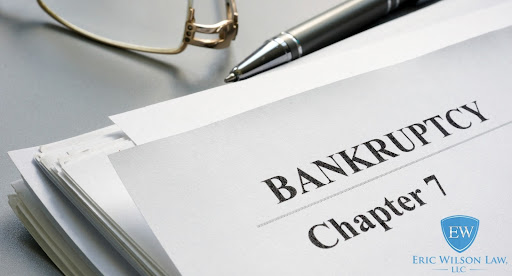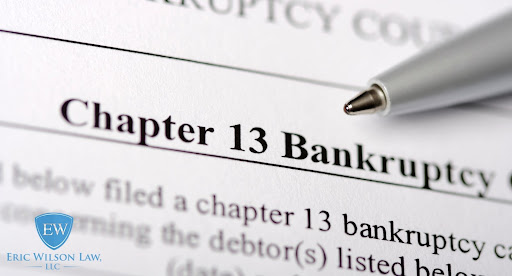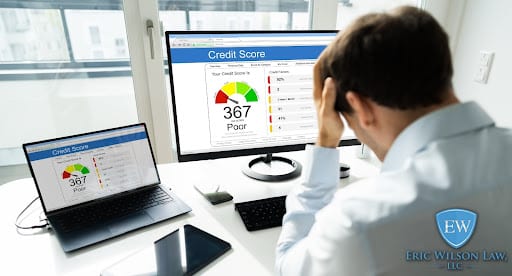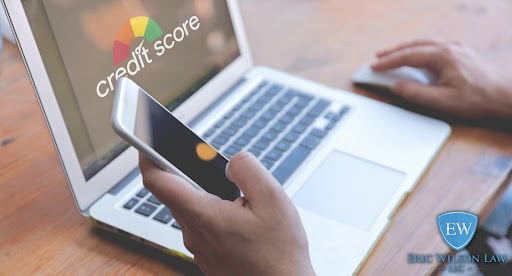Home » Practice Areas » 
You go to work. You pay bills. Rinse and repeat.
Trying to have more disposable income than debt is a goal that seems unattainable for many. This is particularly accurate for those financially treading water. Living debt-free may feel like a distant dream.
There are options for ending harassing creditor phone calls and worrying about making payments on time. Filing for bankruptcy is the solution for many people living this reality. It can eliminate certain outstanding debts and help you gain control of your finances.
Bankruptcy isn’t a decision that should be taken lightly though. You’ll have to learn tough financial information about budgeting your finances, managing your cash flow, saving money, and re-establishing good credit.
But a post-bankruptcy life means a fresh start.
At Eric M. Wilson, LLC, our Tuscaloosa bankruptcy attorneys know that it’s possible to live a good life after bankruptcy. Since 1996, our staff has helped countless individuals in Tuscaloosa, Alabama, and the surrounding areas to achieve bankruptcy relief and move on with their lives. If you’re ready to file bankruptcy and get that infamous fresh start, call us today at 205-349-1280.
You Filed for Bankruptcy, Now What?

It’s tough to begin rebuilding your life after a recent bankruptcy case. After filing, you and your court-appointed bankruptcy trustee meet with your creditors to let them know about the bankruptcy. This is when any non-exempt assets (such as new or expensive cars, valuable collections, or musical instruments not needed for work) may be liquidated, depending on the chapter of bankruptcy you filed. You may retain items such as clothing, household goods, and a car up to a specific value.
As the consequences of filing for bankruptcy continue, you may have difficulty getting car loans (or any other loans) so you may need a cosigner. If the financing you need is not available, you may need a personal loan from a family member or friend.
In addition, it may be difficult to obtain insurance coverage, as some providers may refuse coverage to you after a bankruptcy filing. Further, it may be difficult to find a place to live or even a job because many places run financial checks on applicants.
What is Life Like After Chapter 7 Bankruptcy?
Bankruptcy under Chapter 7 will stick around on your credit report for ten years. That’s a long time, but one of the many benefits of bankruptcy is that it discharges most of your debts. This decreases your debt-to-income ratio, which could raise your credit score in time.
You can implement other credit rebuilding tactics during the bankruptcy recovery process, such as making timely payments and opening a secured credit card.

Check Your Credit After Chapter 7
Usually, the court sends you a letter no more than six months after your filing. This will notify you of your bankruptcy discharge. Your credit reports should reflect your bankruptcy information within another three to six months after receiving the letter. This is when you should request your credit reports from the national credit reporting agencies: Equifax, Experian, and TransUnion. You can receive a free online copy of your report from the aforementioned credit bureaus at AnnualCreditReport.com.
Make sure all the information on your credit reports is correct. Accounts included in the bankruptcy should be labeled “discharged in bankruptcy” and reflect no account balance.
If you reaffirmed some of your debts and they’re not part of the bankruptcy, they shouldn’t be listed as discharged. Make sure your reports also include your continued payments.
If you notice any inaccurate information, contact the applicable agency and find out how to correct or dispute the data.
What is Life Like After Chapter 13 Bankruptcy?
A Chapter 13 bankruptcy does not eliminate your debt. Instead, it restructures your debt in a manageable way so you can make payments over a three to five-year period. It’s vital that you make timely payments while following this plan to avoid future loss of your assets.
When your repayment period ends, most of your debt discharges. This means you’re not responsible for the remainder. The bankruptcy does linger on your credit report for up to seven years. You could lose 200 points on your score.
As in Chapter 7, there are various ways to improve your credit score more quickly.

Check Your Credit After Chapter 13
A Chapter 13 bankruptcy does not discharge your debts until your repayment period ends in three to five years. It can take another three to six months after that to get current credit scores.
Unlike Chapter 7, your account status may not show up in your reports. This is because creditors aren’t required to report payments that you make during your repayment period. However, accounts not included in the bankruptcy should continue reflecting the payments you make.
After your repayment period, you’ll receive notification that your case is discharged. Your credit reports should update within four months. Double-check that all debts included in the repayment plan are closed with zero balances.
Track Your Credit Scores
There are several credit tracking services available. Due to multiple claims for high-profile data breaches in the past few years, many Americans may access these services at no charge. High-profile breaches of Americans’ information include Equifax (2017) and Capital One (2019). In addition, Experian has a free credit monitoring service.
Your scores take a big hit after filing bankruptcy. And if you filed for Chapter 7, your scores may drop even further in a few months when the court discharges the case. Meanwhile, a Chapter 13 bankruptcy doesn’t hit your credit report until the court-appointed repayment period ends.
If your scores have already suffered significantly due to financial difficulties, filing bankruptcy may not affect them much. That’s because the vicious cycle leading to your filing may have done quite a lot of damage, so your score can’t drop much more as a result. Even still, filers with poor credit histories may see improvement in their credit reports after filing for Chapter 13.
Rebuilding Credit After Bankruptcy
Many people worry that bankruptcy destroys their credit forever. This is not true. It is a bankruptcy myth that you will not be able to rebuild credit once your bankruptcy is complete. There are many ways to reestablish a steady credit score after bankruptcy.
At Eric Wilson Law, we’ll advise you on steps you can take to improve your credit immediately after bankruptcy, such as the ones listed below.

Pay Your Bills on Time
Paying your bills and outstanding debt payments on time is possibly the best way to improve your credit score. About 35% of your credit score comes from your payment history. Timely payments will basically show credit unions, credit card companies, and debt collectors that you’re financially responsible.
Get a Secured Credit Card
A secured credit card is another option for rebuilding your credit. A savings account typically backs this type of card. The savings account is collateral for the card and establishes the spending limit.
Paying the card on time helps rebuild your credit, and the issuer may upgrade you to a traditional card after an extended period of timely payments.
Maintain a Job and Home
Steady employment and a stable home address also demonstrates to lenders that you’re reliable. Additionally, this shows creditors that you will pay back your debts and maintain a consistent flow of income.
Some lenders also look at an applicant’s employment history. With a steady job, your approval chances go up. Meanwhile, employment gaps make you look like a risky borrower.
Don’t Use Credit and Live Within Your Means
Avoid spending money you don’t have through cash, debit cards, and checks for a few years. Make sure you live within your means by making a budget and sticking to it.
Build an Emergency Fund
Start putting money into an emergency savings account as soon as possible. Having an emergency fund for unexpected financial needs, such as job loss, will help prevent the buildup of more debt. If you slowly save money, you could eventually save yourself from more bad luck.
How to Create the Best Post-Bankruptcy Life
There is no quick fix after a bankruptcy. Slow and steady is how you reestablish your credit and set yourself up for future financial success. Listed below are the best ways to manage money and get your financial situation under control after bankruptcy.
Opening and Maintaining a New Checking Account
It’s not unusual for debtors to begin receiving credit card offers after a Chapter 7 bankruptcy discharge. Be sure to review the terms and conditions carefully if you apply for a new card. A high-interest rate or an annual fee is typical. Cards with low limits are not ideal because a low spending limit can damage your credit score. That’s because your credit score is partially determined by available credit. So credit cards with higher limits and lower balances are best.
As more time passes after your filing, better loan terms will become available.
If you cannot get a traditional, unsecured credit card, consider getting a secured card through your bank. This type of card typically requires a deposit equal to your line of credit. This is the collateral for the card.
Make regular, on-time payments on this line of credit and ensure the lender reports it to the credit bureau to help boost your score. It’s also best not to spend more than 30% of the card’s available limit.
Changing Spending Habits
Many bankruptcy filers faced unexpected financial trouble that forced them into unmanageable debt. However, others continually overspent their money. If you are someone who had to file bankruptcy due to overspending, it’s time to change your spending habits to avoid future debt.
Looking Out For Your Future Interests After Filing for Bankruptcy
Bankruptcy attorney Eric Wilson isn’t interested in simply collecting a fee and sending you on your way. Instead, he continues to provide counsel on what to expect after your debts discharge through either Chapter 7 or Chapter 13 bankruptcy.
The legal team at Eric Wilson Law offers post-bankruptcy counseling on managing finances, making effective budgets, monitoring your credit report, and more. We’re here to help you take charge of your financial situation once more and continue living debt-free.
Contact Eric Wilson Law to Learn About Life After Bankruptcy

A bankruptcy attorney at Eric Wilson Law, a certified debt relief agency, can help you understand the benefits and drawbacks of bankruptcy. Our legal team will walk you through the entire filing process. Additionally, we’ll teach you about how a bankruptcy filing affects each type of debt you carry, including a mortgage loan, a car loan, credit card debts, student loans and tax debt, and more.
If you are overwhelmed by unmanageable debts, we can help you back onto the road to financial recovery. Call 205-349-1280 today to book your free consultation with our experienced Alabama bankruptcy lawyer.
We are a debt relief agency. We help people file for bankruptcy relief under the Bankruptcy Code.
The following language is required pursuant to Rule 7.2, Alabama Rules of Professional Conduct. No representation is made that the quality of legal services to be performed is greater than the quality of legal services performed by other lawyers. This website is designed for general information only. The information presented at this site should not be construed to be formal legal advice nor the formation of a lawyer/client relationship.
Practice Areas
Office Location
Eric M. Wilson, LLC
1902 8th St Tuscaloosa, AL 35401
205-708-2115
Tuscaloosa Law Office Map and Directions

